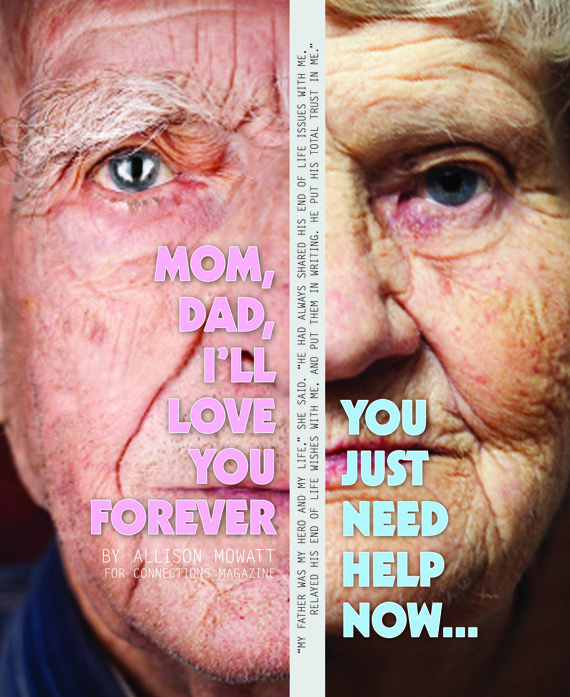Nothing is more emotionally taxing than caring for a terminally ill parent and preparing them for their end of life care. It can be a bittersweet time as well if you’re able to bond and share the good memories while spending this limited together. Depending on the progression of the illness or disease, some people aren’t given this opportunity, so it’s important to take advantage of the time you have with your parent(s) while they are healthy.
Millions of baby boomers are now taking care of their parents during the last stages of their lives. With an estimated 13 million baby boomers caring for elderly parents and with a full 25% of those parents actually living in the home of the adult offspring, many family caregivers nationwide are struggling with how to discern, discuss, and deal with end of life issues with their families. There are many critical end of life topics that need addressing, and it’s important for families to be on board and communicative with one another so the parents’ wishes are carried out, and their last years, months, weeks, or days are spent as lovingly as possible.
Aging and elder care authority, Carolyn Brent, has first-hand experience with this. She is a nationally regarded author and speaker on this topic with a book addressing these issues called “Why Wait? The Baby Boomers’ Guide to Preparing Emotionally, Financially and Legally for a Parent’s Death.”
For twelve years, Ms. Brent cared for her ailing father while he slowly declined, suffering with dementia. “I experienced the bureaucracy of the health care field, enrolling my father in long term care facilities, and a whole spectrum of other things,” said Ms. Brent, who also works in the pharmaceutical industry.
Ms. Brent understands the emotional toll it can take when caring for a parent who is ill and preparing them for end of life care, especially when being the only one carrying this weight regardless of having a large family who could shoulder some of the responsibility. “My father was my hero and my life,” she said. “He had always shared his end of life issues with me, relayed his end of life wishes to me, and put them in writing. He put his total trust in me.”
Although Ms. Brent had many siblings, she was her father’s primary caregiver and oversaw all his needs, from taking him to the doctor to getting him into a long term care facility so he could be watched over while she worked. A very tumultuous and heartbreaking time with her family ensued. Her father needed emergency surgery requiring Ms. Brent to make difficult decisions she wasn’t ready to make. Adding to this stress, a sibling was upset with Ms. Brent as her father’s caregiver, and lawsuits were filed against her despite Ms. Brent having done nothing wrong.
While dealing with the emotional stress of watching her father deteriorate and the heartache of being accused of terrible things by a sibling, Ms. Brent looked to the system to help her. Ms. Brent found dead ends everywhere she went and wasn’t getting the answers she was looking for or the help she needed. The idea for the book was a beacon of light during this tough time. “Care-givers need to safeguard themselves, and it’s my duty to let the public know what is going on,” she said. “I’ve been working tirelessly with U.S. Congress pointing out flaws within the system.” Over the past few years, Ms. Brent worked with legislators. “I’ll spend the rest of my life working to get laws changed to safeguard seniors, veterans, and caregivers. My father’s legacy is me informing the public about these important issues.”
Highlighted on this page are tips and advice from Ms. Brent on how to deal with some of the important end of life topics baby boomers are facing when it comes to caring for their aging parents.
The Cost of an Average Funeral Today and the Alternatives
The cost of an average funeral today nationwide is about $6,000. This is a steep amount, but there are alternatives out there if you still want a memorable service for your loved one without the added cost. A popular alternative is cremation, which runs about $1,500 nationwide. Free cremations are available for those who decide to donate their organs to science.
In addition, you can rent a casket. Start off by purchasing an inexpensive casket to put the body in for burial and rent the fancier casket for the showing of the body at the funeral home. “It’s a good idea to purchase a coffin when you or your loved one is still in a functional state and pre-plan the burial,” advised Ms. Brent. “You tend to make smarter decisions and not let grief rule your thinking process.”
How to Know if an Attorney is Needed to Help with Legal Decisions
As we all know, utilizing an attorney for any reason can rack up fees. The good news is that an attorney is not always needed for these matters. “When a family gets along, they can get together and put the paperwork in order themselves and then submit it to any federal, state, and county officials required,” said Ms. Brent. This can be accomplished for a small price of anywhere between $50 and $100. If a family gets along but feels more comfortable with an impartial party present or if there may be some disagreements pending over the decisions about to be made, then having a mediator present is a good idea.
“This is in case a family is having difficulty coming together to put the documents in order,” said Ms. Brent. Lastly, in the worst case scenario, a family may not get along at all, and in this case, a geriatric attorney would definitely be recommended. “These attorneys specialize in geriatric law,” said Ms. Brent. “I also advise families get a sibling contract drawn up to protect the caregiver who has been caring for the ill parent all along. Also, if a caregiver is abusive, be sure you have proof of this and then file a report.”
The Difference Between Medical Power of Attorney and Directive to Physicians
Medical Power of Attorney and Directive to Physicians usually go hand in hand. A Directive to Physicians often states, “These are my directions to do this…,” which can be that you don’t want to be put on life support, for example. A Medical Power of Attorney is a person appointed to make sure these wishes are carried out.
5 Life or Death
Decisions Everyone Must Know
- Make sure to appoint someone as medical directive. It can be a family member, a doctor, or anyone else you trust. A medical directive records the medical treatments you wish to have or not have if you can’t express your wishes.
- See to it that your wishes are stated and made known to everyone involved. For example, what type of treatment, therapy, or medication is agreed upon? Be sure to get these details out in the open and stated on paper.
- Choose a Power of Attorney; someone who can stand in place for when you can no longer make suitable financial decisions.
- Let it be known how you want to be treated when you’re ill.
- Think about how you want to be remembered. What do you want your legacy to be?


